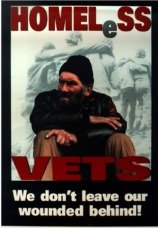 A few weeks ago I read this article on Homeless Iraq Vets and made a note to myself to write about it. I first looked at this phenomenon in November of 2005 while researching for my short story "From Baghdad to Santa Fe". I was looking into soldiers returning with P.T.S.D. or Post Traumatic Stress Disorder. I learned that P.T.S.D. has gone by many names but goes back to all documented wars. In World War One it was commonly called Shell Shocked. In Vietnam many soldiers returned with mental illness and later had a hard time adjusting to civilian life. Vietnam Veterans brought a widespread acknowledgement of P.T.S.D. as a recognized mental disorder. Now our latest P.T.S.D. casualties of war are returning to the U.S. and discovering that the ravages of war are not easily forgotten.
A few weeks ago I read this article on Homeless Iraq Vets and made a note to myself to write about it. I first looked at this phenomenon in November of 2005 while researching for my short story "From Baghdad to Santa Fe". I was looking into soldiers returning with P.T.S.D. or Post Traumatic Stress Disorder. I learned that P.T.S.D. has gone by many names but goes back to all documented wars. In World War One it was commonly called Shell Shocked. In Vietnam many soldiers returned with mental illness and later had a hard time adjusting to civilian life. Vietnam Veterans brought a widespread acknowledgement of P.T.S.D. as a recognized mental disorder. Now our latest P.T.S.D. casualties of war are returning to the U.S. and discovering that the ravages of war are not easily forgotten.P.T.S.D. is not just a soldiers disease it can affect anyone who lives through a traumatic experience. There are cases of P.T.S.D. from those who experienced the September 11, 2001 attacks on America, those who survived the hurricanes that ravaged the east coast, and even victims of domestic violence. One time I had to let go an employee who had an alcohol problem. It was very hard to do because I often wonder whether on the job stress contributed to the employee's problem. We had offered counseling and support but there was a point where the employee had to be let go. Those are the hard decisions that even months or years after its done you still think about from time to time.
Not all homeless vets have P.T.S.D. some just have a hard time finding jobs that pay enough to support themselves and their families. The U. S. Department of Veterans Affairs (VA) says homeless veterans are mostly males (2 % are females). The vast majority are single, most come from poor, disadvantaged communities, 45% suffer from mental illness, and half have substance abuse problems. The VA estimates that nearly 200,000 veterans are homeless on any given night. And more than half a million experience homelessness over the course of a year.
What can we do to affect this problem? In my humble opinion, as employers we need to hire our vets when they return. As a government we need to provide transition services and screening for P.T.S.D.. We need to help match employers with the skills the vets have learned while in the service. We offer large bonuses to the soldiers when they sign up, maybe we need to give some of that money at the end when they leave. We also need to work with the soldiers and get them to save money for after their tours are completed.
National Coalition for Homeless Veterans
A Vietnam Trilogy: Veterans And Post Traumatic Stress : 1968, 1989, 2000 is a very informative book for those experiencing P.T.S.D. or their families.







1 comment:
thanx for reminding us of our obligation to help our homeless vets...as in James Mills best-seller novel...then made into a movie in the 1970's...
I did my best by...better said by a quote from:
http://rockyrights.blogspot.com/
'...James asked me to write a Treatment about my life...let me mention that the legless amputee, a main character in the story, who sold pencils on the street, was someone I met every day in the Flatbush NYC neighborhood, near the Apollo Theater. He impressed me with his outgoing and friendly attitude, and I made a promise to help him out someday other than just buying his pencils, that's why I included him in the matrix.'
I could only speculate that he was a homeless vet...as we never spoke about his physical disability...on any level...
Post a Comment